- Two Thanksgiving Thoughts for the ACAPosted 10 years ago
- Shop til you Drop at the Healthcare Marketplace Part 2: Frustration!Posted 10 years ago
- An Early Casualty in the Affordable Care FightPosted 10 years ago
- Some Good News for a ChangePosted 10 years ago
“The Grand Budapest Hotel” Directed by Wes Anderson
DAN WALKER ON FILM
Cast:
Ralph Fiennes, F. Murray Abraham, Mathieu Amharic, Adrien Brody, Willem Defoe, Jeff Goldblum, Harvey Keitel, Jude Law, Bill Murray, Edward Norton, Tony Revolori, Saoirse Ronan, Jason Swartzman, Lea Seydoux, Tilda Swinton, Tom Wilkinson, Owen Wilson*
Running Time: 100 Minutes
_____________________________________________________________________
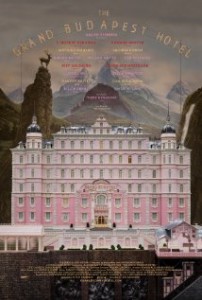 I like all the films of Wes Anderson, one of few directors with a definitive and recognizable directing style, to varying degrees. He really pulls out all the stops with “The Grand Budapest Hotel”, which he also co-wrote. Along with Anderson’s own touches, “The Grand Budapest Hotel” also has a bit of the feel of Jean-Pierre Jeunet’s “Delicatessen” and “The City of Lost Children.” I guess the vibe of the movie can best be described as whimsical bordering on fantasy. Its tone and look also remind me of the Coen Brothers highly stylized “The Hudsucker Proxy.” TGBH is fast paced, dialogue-driven, and visually pleasing almost to the point of overload. It has many beautiful and varied interior and exterior scenes, great dolly shots and, for obsessive compulsives, more symmetrical camera work than I’ve seen in a movie before.
I like all the films of Wes Anderson, one of few directors with a definitive and recognizable directing style, to varying degrees. He really pulls out all the stops with “The Grand Budapest Hotel”, which he also co-wrote. Along with Anderson’s own touches, “The Grand Budapest Hotel” also has a bit of the feel of Jean-Pierre Jeunet’s “Delicatessen” and “The City of Lost Children.” I guess the vibe of the movie can best be described as whimsical bordering on fantasy. Its tone and look also remind me of the Coen Brothers highly stylized “The Hudsucker Proxy.” TGBH is fast paced, dialogue-driven, and visually pleasing almost to the point of overload. It has many beautiful and varied interior and exterior scenes, great dolly shots and, for obsessive compulsives, more symmetrical camera work than I’ve seen in a movie before.
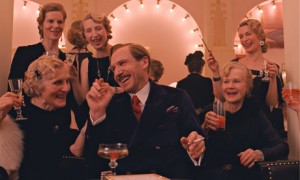 Set in the fictional European country of Zubrowka (which is odd because Budapest is not fictional) between the World Wars, the movie is the story of how lobby boy Zero (played at different ages by 18-year-old Tony Revolori, below left, and F. Murray Abraham), assistant to super-concierge M. Gustave (Ralph Fiennes, right), became the owner of The Grand Budapest Hotel, which is no longer as grand as it once was. Along the way are heist, shootout, prison escape, and chase scenes, among others. The story is told in flashbacks, which are narrated at first by a character only referred to as “author” and “writer” in the film’s credits (portrayed at different ages by Tom Wilkinson and Jude Law, respectively) then by the adult Zero, who tells writer his story.
Set in the fictional European country of Zubrowka (which is odd because Budapest is not fictional) between the World Wars, the movie is the story of how lobby boy Zero (played at different ages by 18-year-old Tony Revolori, below left, and F. Murray Abraham), assistant to super-concierge M. Gustave (Ralph Fiennes, right), became the owner of The Grand Budapest Hotel, which is no longer as grand as it once was. Along the way are heist, shootout, prison escape, and chase scenes, among others. The story is told in flashbacks, which are narrated at first by a character only referred to as “author” and “writer” in the film’s credits (portrayed at different ages by Tom Wilkinson and Jude Law, respectively) then by the adult Zero, who tells writer his story.
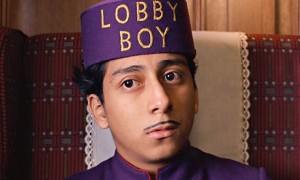 The loaded cast – most of whom have appeared in previous Anderson films – all seem justifiably inspired by the material they are given. No one seems more inspired than lead Ralph Fiennes, who had to love a role that, like the movie, is simultaneously dramatic and comedic. If the film was any more animated, it would have been animated (which Anderson has proven himself adept at with “Fantastic Mr. Fox”). Add to it all the substantial screen time, dialogue, and situations Fiennes is given and I think you have his best role and performance ever. Revolori has the film’s second best role and is understated and excellent in it. Revolori’s eyes , especially the way his face is framed early in the film, make a comparison to Pee Wee Herman unavoidable and they contribute to the character’s appeal. The makeup on Tilda Swinton (below right) as the 84-year-old dowager/lover/murder victim is so good, along with her typically great acting, that I never stood a chance of recognizing her and didn’t realize it was her until after I saw the movie.
The loaded cast – most of whom have appeared in previous Anderson films – all seem justifiably inspired by the material they are given. No one seems more inspired than lead Ralph Fiennes, who had to love a role that, like the movie, is simultaneously dramatic and comedic. If the film was any more animated, it would have been animated (which Anderson has proven himself adept at with “Fantastic Mr. Fox”). Add to it all the substantial screen time, dialogue, and situations Fiennes is given and I think you have his best role and performance ever. Revolori has the film’s second best role and is understated and excellent in it. Revolori’s eyes , especially the way his face is framed early in the film, make a comparison to Pee Wee Herman unavoidable and they contribute to the character’s appeal. The makeup on Tilda Swinton (below right) as the 84-year-old dowager/lover/murder victim is so good, along with her typically great acting, that I never stood a chance of recognizing her and didn’t realize it was her until after I saw the movie.
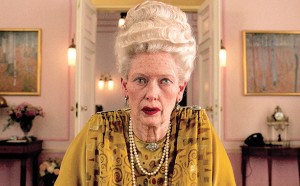 The movie is technically tight and its showiness may even be excessive to the point of being unrelenting but it sure makes for a fun, energized viewing experience. I’m generally sensitive and critical if I feel a movie is overdone but I can’t fault Anderson for anything about “The Grand Budapest Hotel.” Because I was so focused on the fast-moving storyline and trying to keep up with all the characters, I didn’t notice until well into the film that the aspect ratio for the flashback scenes (most of the movie) is 1.37:1 (a “square” picture), while the present day scenes are shot in 2.35:1 (widescreen). Alexandre Desplat’s score is appropriately vibrant without being overpowering and distracting. As good scores do, it helps dictate how you interpret what’s on screen, especially during violent scenes.
The movie is technically tight and its showiness may even be excessive to the point of being unrelenting but it sure makes for a fun, energized viewing experience. I’m generally sensitive and critical if I feel a movie is overdone but I can’t fault Anderson for anything about “The Grand Budapest Hotel.” Because I was so focused on the fast-moving storyline and trying to keep up with all the characters, I didn’t notice until well into the film that the aspect ratio for the flashback scenes (most of the movie) is 1.37:1 (a “square” picture), while the present day scenes are shot in 2.35:1 (widescreen). Alexandre Desplat’s score is appropriately vibrant without being overpowering and distracting. As good scores do, it helps dictate how you interpret what’s on screen, especially during violent scenes.
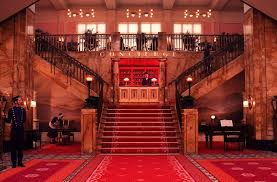 I’m compelled to say that a movie (and director) that makes this strong an artistic statement is bound to anger some viewers the way Quentin Tarantino’s (another director with a definitive and recognizable style) movies do. To those viewers my recommendation is to simply not watch movies by these directors. For people who watched the movie and really disliked it and expected something else, if you’ve seen Anderson’s movies before (and the movie’s trailers), you had to have an idea of what the it was going to be like before seeing it. I can react the same way, and did so with Paul Thomas Anderson’s (no relation) 1999 “Magnolia”, a movie I found infuriatingly self-important when it released. I watch it every few years and my relationship with it has evolved from hate to love-hate.
I’m compelled to say that a movie (and director) that makes this strong an artistic statement is bound to anger some viewers the way Quentin Tarantino’s (another director with a definitive and recognizable style) movies do. To those viewers my recommendation is to simply not watch movies by these directors. For people who watched the movie and really disliked it and expected something else, if you’ve seen Anderson’s movies before (and the movie’s trailers), you had to have an idea of what the it was going to be like before seeing it. I can react the same way, and did so with Paul Thomas Anderson’s (no relation) 1999 “Magnolia”, a movie I found infuriatingly self-important when it released. I watch it every few years and my relationship with it has evolved from hate to love-hate.
I know it’s early to talk about Oscars but this is easily an Oscar-caliber film and it shouldn’t be adversely affected by its early-year release. It would have been much more appropriate to have opened it at the end of the year because it makes for an exceptional holiday movie. Even if it releases on DVD before then, it should re-release on the big screen as an Oscar consideration reminder as well as to add to the spirit of the holiday season. I don’t remember the last time I had this much fun at a movie house.
DPW
April 19, 2014
*I don’t list the main cast members along with three of their movie credits like I normally do because there are so many recognizable actors in the film.
According to imdb, George Clooney makes an uncredited cameo in a shootout scene. With the appearances of Wilkinson and Swinton, the film reunites the principals from Tony Gilroy’s 2007 “Michael Clayton”, which won both Clooney and Swinton Best Supporting Oscars.
It’s a coincidence that this movie and the one I just reviewed, “Inside Llewyn Davis”, both feature F. Murray Abraham. I don’t think I’ve seen in him a movie since John McTiernan’s 1993 “Last Action Hero” (a guilty pleasure) and, before that, his Oscar-winning performance in Milos Forman’s 1984 “Amadeus.”
Added 4/21/2014:
I wish I could have been in the audience for this stage reading of QuentinTarantino’s “Hateful Eight”: http://www.deadline.com/2014/04/hateful-eight-live-read-quentin-tarantino-script-los-angeles/
Tarantino is suing Gawker for copyright infringement because the script was leaked online. Copy and paste the link to read more about the reading and the lawsuit.

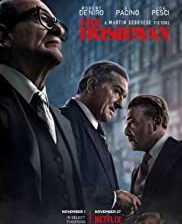

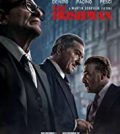
As I often share and respect your views, since you have never had so much fun at a movie house with this selection, I want to watch it. Thanks Dan.
Another great review! Thanks Dan!